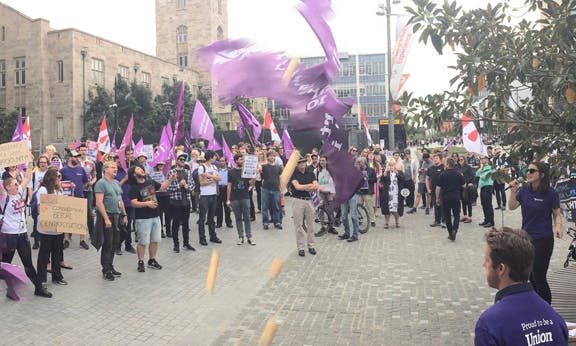Fighting for jobs at Sydney University

University of Sydney staff are fighting to protect jobs and working conditions in the information technology, human resources, campus infrastructure and finance help desk services.
In August, the university released a proposal to centralise the four services into one corporate-style call centre. The proposal affects about 60 staff and, if implemented, will cut the number of positions by almost 20 percent over three years.
Like most proposals from management, the restructure aims to squeeze more out of workers by making a smaller pool of staff do more work.
A petition drafted by the union demanding job security and no job cuts and rejecting spill-and-fill practices gathered more than 800 signatures. A campus-wide union meeting drew around 100 staff, and a rally to protest the cuts on 3 October was the largest union event on campus since the enterprise bargaining agreement campaign last year.
The rally was called on short notice and drew 300 staff. Attendees heard speeches from affected staff, including information technology help desk delegate Dave Burrows, who got the loudest cheer after suggesting, “Instead of cutting at the grassroots, maybe it's time to start trimming from the top”.
By coincidence, the delegation happened to spot the provost, Stephen Garton, inside an expensive new restaurant and decided to confront him about the cuts. After pointing out that he was one of the overpaid executives on campus and handing him the 800-strong petition, staff grilled him about the job cuts.
Since 2011 and the release of the university’s strategic plan, more and more departments are facing restructures. Each time it is the same story: staff are forced to reapply for a smaller number of jobs, often at lower pay, and services are centralised to increase productivity (i.e. workers work harder for less).
The current anti-restructure campaign is notable for its success at forcing some concessions from management. Key to this has been the union’s willingness to lead a public campaign that has dragged the dispute into the open.
One of the concessions has been in deskilling. Management’s initial proposal involved making staff who currently specialise in an area change to a more generalised role in the wider call centre. This would mean answering inquiries across several departments in a less skilled role, making staff easier to sack or replace.
Another concession has been in relation to staff involvement in the design of the restructure. A group of staff are now part of the process, something unheard of in most restructures.
This shows that even in situations where strike action is not a realistic option, it is still possible to organise with some success. However, the key issues of redundancies and cuts to the staffing budget remain outstanding and will take a serious fight if they are to be stopped.